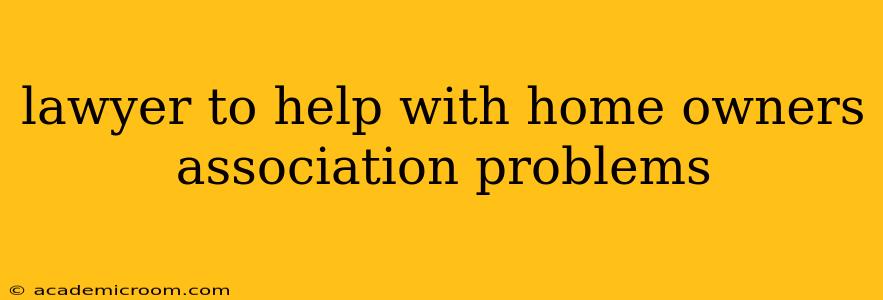Dealing with a homeowners association (HOA) can sometimes feel like navigating a minefield. Disputes over architectural changes, noise complaints, or assessments can quickly escalate, leaving homeowners feeling frustrated and overwhelmed. Knowing when and how to seek legal assistance is crucial. This guide will help you understand when you need a lawyer to help with your HOA problems and how to find the right one for your situation.
When Do I Need a Lawyer for HOA Issues?
Many HOA disputes start small but can quickly become serious legal matters. Consider seeking legal counsel when:
- You've received a cease and desist letter: This is a formal legal notice, and ignoring it can have severe consequences. A lawyer can help you understand your rights and respond appropriately.
- The HOA is violating your rights: HOAs have certain powers, but they can't violate your rights under federal, state, or local law. This includes issues related to fair housing, due process, and freedom of speech.
- You're facing fines or penalties: Excessive or unjustified fines can be challenged in court with the help of a lawyer.
- The HOA is refusing to address a serious problem: If the HOA is ignoring necessary repairs or safety concerns, legal action might be necessary.
- Mediation or arbitration has failed: These alternative dispute resolution methods are often recommended before litigation, but if they don't resolve the issue, a lawyer can help you pursue legal options.
- You're considering suing the HOA: This should be a last resort, but a lawyer can guide you through the process and represent your interests in court.
What Types of Lawyers Handle HOA Disputes?
While any experienced attorney could potentially handle an HOA dispute, it's beneficial to find someone specializing in real estate law or community association law. These lawyers have the specific knowledge and experience to navigate the complexities of HOA regulations and state statutes.
Finding the Right Lawyer for Your HOA Problems:
- Referrals: Ask friends, family, or neighbors for recommendations.
- Online Searches: Search online directories like Avvo, Martindale-Hubbell, or your state bar association's website.
- State Bar Association: Your state bar association can provide referrals to attorneys licensed to practice in your area. They may even have a lawyer referral service.
- Consultations: Schedule consultations with several lawyers to discuss your case and assess their expertise and experience. Many lawyers offer free initial consultations.
What Questions Should I Ask a Lawyer During a Consultation?
- Experience with HOA disputes: How many HOA cases have they handled, and what was the outcome?
- Fees and payment options: Understand their fees, payment structure, and whether they offer payment plans.
- Communication style: Do they communicate regularly and keep clients informed?
- Case strategy: How do they plan to approach your case, and what are the potential outcomes?
- Trial experience: If the case goes to trial, do they have the experience to handle it?
How Much Will a Lawyer Cost to Handle HOA Problems?
The cost of legal representation can vary widely based on several factors, including the complexity of the case, the lawyer's experience, the location, and the amount of time required. You should clarify the lawyer's fee structure upfront; it's usually either hourly, flat-fee, or contingency-based. Be prepared to discuss a payment plan if needed.
Can I Represent Myself in an HOA Dispute?
While it’s possible to represent yourself in an HOA dispute, it's generally not recommended, especially if the matter is complex or involves significant legal ramifications. HOA rules and regulations can be intricate, and a lawyer’s expertise is valuable in interpreting them and developing a successful strategy. You risk making costly mistakes without legal guidance.
By carefully considering your situation and following these steps, you can find a qualified lawyer to effectively represent your interests and resolve your HOA problems. Remember, early intervention can often save time, money, and frustration in the long run.
